- Home
- P. N. Elrod
The Hanged Man Page 2
The Hanged Man Read online
Page 2
She’d encountered those before, the normal residue left by those who found the body. People tended to have the same emotions when death paid a call. While she could not say that she was used to such, they no longer overwhelmed her. On her very first case she’d opened up too quickly and fallen over in a faint. The instructor had been prepared. Alex struggled awake to the burning sting of smelling salts in her nose and was sharply told to show greater care for herself. She got no more sympathy than a medical student fainting at their first anatomy lesson.
Of course, those students made a choice to become doctors or nurses. If unable and unwilling to handle the necessary requirements of their art, they could find another occupation. Alex had been born to this particular work. As with others possessing psychical talent, it ran in her family, and she had been blessed (or cursed) with a particularly strong ability. Her choices had been to learn to control it or go mad.
Perhaps I’m mad and no one’s noticed yet.
She always thought that just before looking on a corpse. It was a tired observation, long bereft of its feeble humor, its very weariness a comforting affirmation that she was in her right senses.
She paused before the door, which was ajar. The gas was on within and strange shadows swung lazily on the hall floor. She pushed gently forward to see what cast them.
The taint of night soil hung heavily in the air, turning her stomach. In all the stories and books she read for pleasure, none of the writers ever made mention of this noisome aspect that attended the discovery of a corpse. Either they’d never dealt with death themselves, or deemed the subject indelicate.
Alex kept handkerchiefs in a jar of rosewater on her dressing table. Just before leaving on a call, she’d wring one out, tuck it into an oilcloth pouch, and tuck that into a pocket of her waistcoat. She retrieved the one she’d taken tonight, holding it to her nose, then pushed the door wide.
It was a room for a gentleman, furnished with a big bed and a reading chair by the window. There had been a fire in the grate; a few coals glowed but offered no warmth. A window was raised high, and the air was freezing.
Otherwise everything was normal, except for the man’s corpse hanging from the gas chandelier in the center of the room. His back was to her, which made it easier. However they died, she avoided looking at their faces. After burnings and drownings, hangings were the worst. The last one, with its bulging black tongue, bloodshot eyes popped wide, and horrifically elongated neck would last her a lifetime.
Alex had no need to look, anyway.
Her job, God help her, was to feel.
A suicide? The chandelier must be singularly sturdy to hold such a weight. Then she noticed the rope was looped over the same large hook in the ceiling that held the light. The hook had been driven deeply into a support beam hidden by plaster, certainly strong enough to carry out an act of self-destruction like this.
The chief grotesquery was that the gas yet burned. The body, so near to the source of light, cast a deep shadow upon the floor and walls. The man’s gray head was against one of the glass globes. While still alive he must surely have flinched from the heat. Why had he lighted the gas? Why not that candle on the bedside table?
While death occasionally possessed a macabre humor, it was never kindly, particularly with suicides who hanged themselves. The bowels and bladder had given way, which accounted for the bad smell. The rose scent in her handkerchief could not wholly overcome the reek, but it kept Alex from retching.
His bare feet dangled loose and vulnerable under the blue nightshirt. A draft created by the open door stirred its pale folds; otherwise the corpse was quite still. His slippers were next to the bed, which was rumpled from occupancy. Had he crept under the covers to stare at the ceiling until unrelenting hopelessness caused him to rise and end his torment?
While it was not outside possibility, there was a false note to the terrible scene before her. Several, in fact.
If he planned ahead enough to bring a rope, why bother going to bed? There was no need to mislead the servants; as master of the house he had only to shut the door and attend to his repugnant undertaking in private.
Why undress for bed? While she had encountered suicides who stripped naked to meet their Maker, most kept their clothes on. In one case, the lady put on her wedding dress and reclined prettily on a chaise lounge while a draught of laudanum took her into the next world.
Why choose such a long, painful death by strangulation? If he had been a doctor then there would be better choices in his medical bag. Laudanum, morphine, or heroin were painless and just as effective.
Well, the initial discovery was out of the way, time to get on with the rest of it, and there, perhaps, find answers.
Murder victims tended to be surprised, terrified, or enraged, leaving those feelings behind in the wake of an attack removing them from life. Those who passed due to accident often left nothing at all, if their death was sudden enough. She’d encountered that in the aftermath of a train wreck. A great number of the dead hadn’t known what befell them and all that remained were their poor broken bodies. Most of the emotions she’d gotten had been from those whose work was to remove and attend the dead. It had run to ghoulish humor. Ugh.
Suicides, though, had weeks, months, even years of despair and anguish about them. It built up like silt in a river. It bogged them down, trapped them, tortured them until they finally succumbed willingly to end the pain.
But hanging was a singularly agonizing way to die. It always took longer than expected. The pain, shock, and helplessness usually left an imprint of emotion as harsh as any violent murder.
Alex opened herself a tiny bit more, bracing for the worst.
But nothing came.
Which was not normal.
She opened still more, eyes shut, and cast about like a hunting hound. There was the discordant rasping shock here in the doorway. That would be from the person or persons who had found the body.
A servant had found him, male, his valet or butler. The horror and sincere grief were profound, but not the same sort one got from a relation or a spouse. A calm fellow, he’d likely seen death before and recognized it readily enough. A relative might immediately take down the body in an attempt to revive it or to conceal the self-slaughter, but this one had been left as found. The man was clearly dead—nothing to do but alert the authorities.
As for the room’s late occupant—odd—there was no trace of melancholy at all, which puzzled her. Why, then, had this man killed himself?
No emotional residue presented itself to answer. The only feelings here were of self-satisfaction, a sense of accomplishment, anticipation—not at all what she’d expected.
If not suicide, then murder?
But she found no trace of that either, unless that satisfaction belonged to the perpetrator. Not likely, for the emotion was well attached to the general atmosphere of the room, imprinted there by its most habitual occupant.
The man had not killed himself, nor had he been awake to resist an attacker. He’d passed unaware. Considering the agony of such a death, that was just as well, but it was impossible that he could have slept through it. Had he been in a drunken stupor?
The attacker had left no sign of himself behind. Not one hint remained of anger, jealousy, love, hate, or any of the myriad emotions that drove one human to take the life of another.
That was impossible. There was always something; an action as intense as murder always left a stain. She’d never been at a scene of violence that did not have motivational emotions lingering about. They lay like shards of broken glass, and one could follow them to the source if it was a fresh enough trail.
But no such trail existed here. Had there been a psychic cleansing, then it would have removed the latent emotions of the dead occupant as well.
Opening her eyes, Alex shut down the inner mechanism of nature that others ironically called her “gift” and switched to her cultivated talent for observation.
A chest was at the foot of th
e bed, nearly under the chandelier hook. The dead man’s right ankle brushed against the chest’s side. Supposedly he stood on it, secured one end of the rope to the ceiling hook, then stepped off.
It would have been difficult to lift an unresisting body up high enough to slip a noose around its neck. Even to loop it first, then hoist the body up using the ceiling hook as a pulley would require a strong, strapping fellow. Two would have found it easier, but she could not think how one man could have erased his psychic spoor, much less two.
No shoe prints or scuffs were visible on the bare wood of the chest. A few swipes with a gloved hand would take care of that.
First things first: How had the killer gotten in and out?
The window was the likely point of entry. Perhaps the late tenant enjoyed fresh air; some hardy sorts left their windows wide open, even in this weather. She crossed the room. The latch was unengaged. He could have left it cracked and an intruder took advantage of it.
“What are you about?” demanded Lennon. He’d been quiet during her psychical scrutiny, which was now clearly over.
“Checking things,” she said, peering at the sill. It was wet from sleet melting on the relatively warmer surface of it and the floor. Had there been footprints left by an intruder, they were lost now.
He grunted and joined her. If the stench bothered him, he gave no sign. “You think someone done for him?”
“Yes. Despite appearances, this is a murder.”
“That what his ghost told you?”
“Inspector, you are well aware that I Read only the emotions left by the living, not the dead. What I found tells me that this poor man did not kill himself. He was somehow rendered insensible, then hung up like a Christmas goose at a butcher’s.”
“Who done for him, then?”
“I can’t tell. There’s no psychical trace of the killer.”
“Meaning?”
“Whoever did this left no muddy footprints for a Reader to follow. He’s psychically invisible, and that’s impossible.”
“Your whole Service is impossible, and yet here you are.”
“Which is your good fortune, Inspector. This is something new; you’ll have the credit for it.”
“Keep your credit. You can’t see him? Then how do you know anyone was here?”
She shook her head. Trying to explain the emptiness to him would be like describing light and color to a blind person.
“If you think someone topped him, show me real proof, Miss Pendlebury.”
That might be a problem. There was no city soot on the outer sill to hold footprints either.
“My missus should clean this well,” grumbled Lennon. “Someone could have got in and out this way, but he’d have been seen. Someone in the street would have noticed a ladder where it shouldn’t be. There’s idlers about. We questioned them, they didn’t see anything.”
“What about a misplaced mountaineer dangling from the roof like a great spider?” she asked. “People aren’t likely to look up in this weather.”
“There’s that,” he conceded. “Though anyone at a window across the way would notice. But at this hour and in this dark—”
“Otherwise the only entry and exit is the room’s one door.”
“Unless you think there’s a secret passage behind the fireplace.”
“I should be most surprised if there was.” The layout of this house was similar enough to her own, and hers had no such feature.
“You’re minded that it’s a sneak-thief?”
“If not a thief, then a sneak with murderous intent and the intelligence to arrange this to be taken for a suicide. I suggest sending someone observant to examine the roof, otherwise this horrid deed may have been done by a member of the household or one letting in a murderous confederate.”
Lennon’s eyes narrowed and his jaw worked as he grunted agreement. He had not risen through the ranks at Scotland Yard by being a fool. While showing unflagging contempt for her psychical talent, he never discounted her observational skills.
Again, she cast about, searching every corner, every item in the room.
The table next to the bed held a water carafe and a glass on a little tray. Neither had apparently been used, but a clever killer would have tidied things.
Alex went to the bedside to examine the carafe. There were potent soporifics without color, though they were often detectable by taste or smell. If one wanted to render a person insensible, then a large amount would have to be dissolved in the carafe—and when would the killer have an opportunity to do that?
“You think there’s something nasty in his water?” Lennon asked.
“It’s too uncertain. How could he be sure his victim would even take a drink in the night? Or when?”
“Too true, but I’ll collect it in evidence.”
Someone had silently entered the room and—what? Injected the man with some substance? If so, then the sting of the needle had not wakened him. The medical examiner might find the puncture, giving lie to this being a suicide.
“What makes this murder, eh?” pressed Lennon.
Alex checked a drawer in the bedside table. Inside was a pocket watch and a Bible. She had to forsake the scented handkerchief, needing both hands. She took a deep breath, then picked up the watch and used the small key on its chain to wind it. A quarter turn and no more, so he’d wound it before retiring, read a bit of his Bible, then put out his candle, just as a thousand other men might do.
“What suicide troubles to wind his watch?” she asked.
“Force of habit,” Lennon countered. “I’ve seen queerer stuff. What else?”
Her pent-up breath puffed out as she put the items back, and she did not get the handkerchief to her nose in time, catching a whiff of the stench—and something else.
She bent to sniff the man’s pillow.
Sharp and astringent, no more than a whisper of it remained, and that was well masked by the stronger smell of night soil, and further diluted by the freezing air blowing in; this death might well be ruled a suicide but for that.
“Got you,” she said, pointing and stepping back to make room for the inspector.
He shot her a suspicious glare, as though expecting a trick, then bent and breathed in.
He snorted, but not dismissively. “Now that is interesting. Let’s have another opinion, just to be sure. Brook! Up here on the double!”
Brook must have been at the foot of the stairs. He charged up in quick response to Lennon’s bellow, but stopped short in the doorway to stare at the corpse, and lost much of his color.
“In here, man,” Lennon snapped. “That beggar’s past harming aught.”
Brook visibly braced himself, assuming the carefully blank expression again, and came forward.
“Put your beezer to that pillow and tell me what’s there.”
With puzzled reluctance, Brook did so, then straightened. “It’s … like a hospital?” he hazarded.
“Yes, something you might notice in a hospital,” Lennon prompted.
“Not carbolic or vinegar.… Pungent stuff.”
“You’d think so. Ever have surgery? Of course not. I have, and when you’re facing a jolly fellow in a black coat with a knife in his hand you’ll bless the stink of this poison. It’ll turn your belly over after, but better than being awake when the cuttin’ starts.”
“Ether,” Brook said. “Of course.”
“Just so.” The two of them looked at the body and back to the pillow. No need to explain to Brook; he’d clearly grasped that foul play had been involved.
Lennon said, “Once they clean him up, they’ll find ether still trapped in his lungs. Anyone will be smelling that off him for days. When I come back from getting cut, my missus had the windows up, complaining how it filled the house just from my breathing.”
Lennon’s emotions were starting to contaminate the scene. He was excited, interested, and eager to press forward, having embraced Alex’s conclusion as his own. Nothing left but to find the murd
erer so far as he was concerned. She was pleased with the validation but resisted the temptation to thank him for it.
He opened the drawer and fingered the deceased’s pocket watch, showing its face to Brook. “Make a note of the time and that the smell of ether was detected on the pillow by the three of us. Then make an inventory of all the items in here, starting with this bauble. Mind you get everything down. I won’t have some sticky-fingered servant claiming anything went missing while I was on duty.”
Brook produced a notebook and a pencil and wrote as instructed.
“Did the butler find the body?” she asked.
“The valet,” said Lennon. “He was doing the last rounds before turning in, making sure the windows were shut and the gas off, saw the light under the door, and looked in. Apparently it was unusual for his master to be up so late.”
“A steady fellow?”
“Seems steady enough. What’s that to do with anything?”
“You can thank him for keeping the room untouched. I should think he may have had some police training at some point.”
“We’ll stand him a drink at the nearest pub, then. Brook, make a sketch of the room while you’re at it. Come along, ghost-catcher.” Lennon went out.
“Sketch?” Brook echoed. “I’m no artist.” He looked at Alex a little helplessly. “Do you draw, miss?”
“Not that sort of sketch,” Alex said kindly. “He wants a map of the room, approximate dimensions, placement of furnishings, window, door, and the body.”
“Oh. I can do that. Thank you, miss.”
“Two copies, if you please. One for the Yard, another for the Service. As identical as possible.”
Alex caught up with Lennon at the far end of the hall. He held a lantern and had a door open. Narrow stairs lay beyond. He bulled up, the lantern’s pale light dancing drunkenly on the plain walls. She knew what would be next and cursed him. He’d take great enjoyment grumbling about the delay if she went to fetch her coat, and she refused to give him the satisfaction. She followed him to the servants’ floor. To judge by the clothing left out, the females of the household had the whole of it, and it was quite nice. Only two to a room and at one end was the unheard-of luxury of a water closet. That must have cost a few pennies.

 I, Strahd: The War Against Azalin
I, Strahd: The War Against Azalin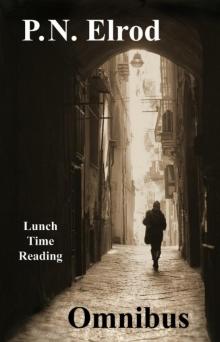 P N Elrod Omnibus
P N Elrod Omnibus Bloodlist
Bloodlist I, Strahd: The Memoirs of a Vampire
I, Strahd: The Memoirs of a Vampire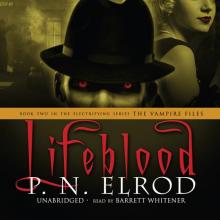 Lifeblood
Lifeblood Song in the Dark
Song in the Dark The Vampire Files, Volume One
The Vampire Files, Volume One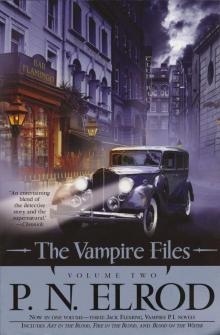 Fire In The Blood
Fire In The Blood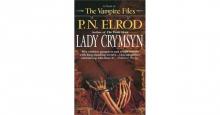 Lady Crymsyn
Lady Crymsyn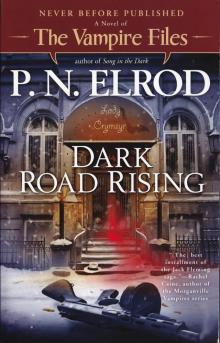 Dark Road Rising
Dark Road Rising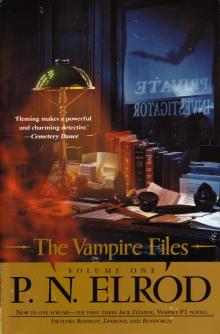 The Adventures of Myhr
The Adventures of Myhr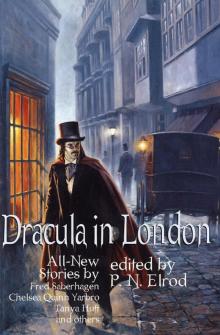 Dracula_in_London
Dracula_in_London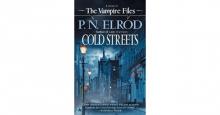 Cold Streets
Cold Streets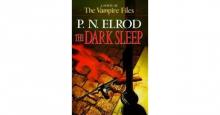 The Dark Sleep
The Dark Sleep The Vampire Files, Volume Two
The Vampire Files, Volume Two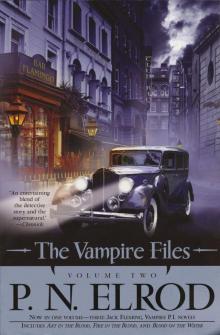 Blood on the Water
Blood on the Water The Vampire Files Anthology
The Vampire Files Anthology The Vampire Files, Volume Four
The Vampire Files, Volume Four A Chill In The Blood
A Chill In The Blood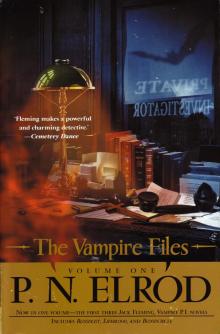 Bloodcircle
Bloodcircle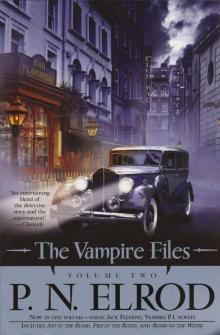 Art In The Blood
Art In The Blood The Vampire Files, Volume Three
The Vampire Files, Volume Three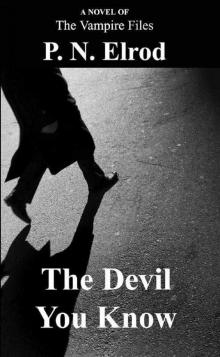 The Devil You Know
The Devil You Know Hex Appeal
Hex Appeal Jonathan Barrett Gentleman Vampire
Jonathan Barrett Gentleman Vampire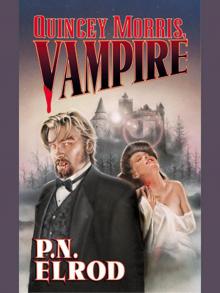 Quincey Morris, Vampire
Quincey Morris, Vampire Strange Brew
Strange Brew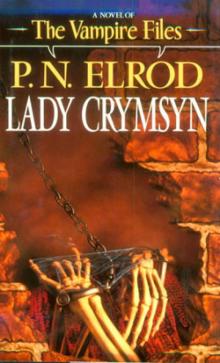 Lady Crymsy
Lady Crymsy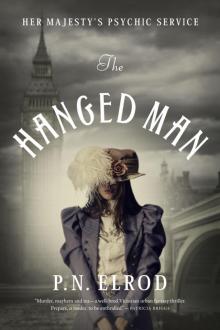 The Hanged Man
The Hanged Man